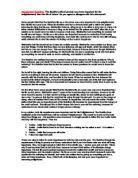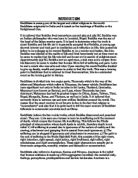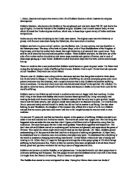The Buddhas life of poverty was more important for his enlightenment, than his life of riches Do you agree or disagree with this statement?
Assessment Question: 'The Buddha's life of poverty was more important for his enlightenment, than his life of riches' Do you agree or disagree with this statement? Some people think that the Buddha's life as a rich prince was more important for his enlightenment, than his life as a poor man. When the Buddha was born a fortune teller paid a visit to the palace informing the king that his son, Siddhartha Gotama, will grow up to be either a holy man or a king. His father wanted Siddhartha to become a king, so he locked him the palace and didn't allow him to go outside so he would never be able to become a holy man. Siddhartha had everything he wanted, but he still was not happy. His life as a rich prince was important because he understood that having everything you want does not bring happiness, and made him curious as to why he was still unhappy, which allowed him to start his mission in finding out the route to happiness. Siddhartha told his chariot driver to take him outside secretly. Siddhartha went outside four times, and saw four things. On the first three trips, he saw sickness, old age and death, which his chariot driver told him no one can escape from. This was important, because it shows that even though Siddhartha was rich, he still can't escape suffering. On his fourth trip, he saw a wandering monk who had given up everything he owned to seek an end to suffering,
Buddist ethics - The war on Iraq.
Hossein Amini 4H BUDDHIST ETHICS: THE WAR ON IRAQ Mr Blair, in light of your constant apprehension on the War with Iraq, which is now greatly looming upon us all, I would like to raise a few aspects that I feel are necessary, before you declare this war. Mr Blair, you must seriously keep an open mind about what you are doing. The history of mankind is a continuous manifestation of man's greed, hatred, pride, jealousy, selfishness and delusion. During the past 3,000 years, many, many wars have taken place. Is this really, a major characteristic of a man? What is his destiny, and how can men bring destruction onto one another? Although it can be said that man has invented several important and critical advances in technology, they have also on the other hand took a step forward to the destruction of their own kind. This is exactly how many of the great civilisations, the Aztecs, the Romans, the Greeks, the Ottomans, have all been completely erased from this earth. Modern man has become so sophisticated in the art and technique of military warfare, that it is possible to turn mankind into ashes within just a few seconds. Thus, the world has turned into a storehouse of military hardware as a result of the game called 'Military Superiority' I have know been told, that the prototype of a new nuclear weapon, being built, is more powerful than the atomic bomb dropped on
Buddhism is among one of the largest and oldest religions in the world.
BUDDHISM Buddhism is among one of the largest and oldest religions in the world. Buddhism originated in India and is based on the teachings of Buddha or the Enlightened One. It is believed that Buddha lived somewhere around 563 and 483 BC. Buddha was an Indian philosopher who was born in Lumbini, Nepal. Buddha was the son of the head of the Sakya warrior caste. It is hard to determine what the truth is about Buddha and his life but it is generally accepted that Buddha, at young age showed interest and took part in meditation and reflection on life; this caused his father to be unhappy as he wanted Buddha to be a warrior and leader, like him. Buddha was blinded of the reality of life and lived luxuriously but as time went on he came to realize that his life was dull and he set out in search of enlightenment. Approximately 533 BC, Buddha met an aged man, a sick man and a corpse; from his discovery he came to realize that human life is full of suffering and pain. Later he met a monk who was calm and wise. Upon meeting the monk Buddha decided to give up family, wealth and power in order to find the truth. This was a turning point in Buddhism that is referred to Great Renunciation; this is a celebrated event as the turning point in history. Buddhism is divided into two major parts, Theravada which is the way of the elders and Mayahana which refers to Hinayana, the lesser
Are the five precepts realistic principles for a Buddhist to live by today?
Are the five precepts realistic principles for a Buddhist to live by today? I personally think that the five precepts are realistic enough because they are quite similar to the things that a Muslim may or may not do. The reason I say this is because I am a Muslim and some of these precepts are the same for me to follow in everyday life. For example, precept 2: 'I undertake to abstain from taking what is not freely given' In other words, it means No stealing or any form of exploitation or taking advantage of someone. This should not be hard to follow because, first of all; this is against the law and I doubt it that any other religion would allow stealing. All of the precepts are really what I, as a Muslim is not allowed to do, except the first one ('to abstain from harming living beings'). The reason I have brought myself into this is because as I said before, I do most of these and I don't find any of them hard to follow so why should a Buddhist? The obvious answer to the title would definitely be yes, because they are the same as what people with other faiths must not do. Precept 1 is a very simple precept and must be easy to follow, since there are millions of other vegetarians from other faiths in our world and they find it easy and realistic enough. I think that it is easy to survive by being a vegetarian, because there are a lot of other foods to eat except meat
Buddhist Monks and Nuns.
Monks are one of the most important people in a Buddhist community. They have a very special daily routine. They all wear yellow robes and shave their heads. They don't grow food and only have one meal a day. They also aren't allowed to eat meat because they don't want to hurt other animals. But if offered meat then they shall eat it as it is rude to not accept a present. Monks have begging bowls where they are given food in because they are not allowed to grow food they have to beg it. To learn a bit more about Monks and Nuns we have interviewed a very famous Buddhist, in fact he started Buddhism, you can all guess who he is Prince Siddhartha Gautama (the Buddha). We have interviewed him on our beloved program "Every day with a Buddhist". It is nice to have you on our Show. Thanks, a lot I really have the honour of being on TV because they were not supposed to be invented at my time. Firstly, Prince Gautama we will start by asking you some questions and then we will be asking our manager what he thinks about Buddhist Monks. Why do Buddhist monks and nuns wear a yellow robe? When the Buddhist followers looked into the jungle they could always tell which leaves were about to drop from the tree, because they were either yellow, orange or brown. In India, yellow became the colour of meditations. Monks and nuns robes are yellow so they can act as a constant reminder of the
Select, describe and explain the events in the life of Siddatta Gautama which illustrate his religious development.
. Select, describe and explain the events in the life of Siddatta Gautama which illustrate his religious development. Siddatta Gautama, who became the Buddha or 'the enlightened one' was born about 560 BC and died at the age of eighty. He was the founder of the Buddhist religion. Siddatta lived in north-eastern India, an area which followed the Hindu religious tradition, which was, in those days a great variety of Indian traditions and practices. Indian society was then divided up by the Hindu caste system. The highest caste were the Brahmins or priests, with the next caste down being the Kshatriyas, who were rulers or soldiers. Siddatta was born in a place called Lumbini, into the Shakya clan. He was a prince, and was therefore in the Kshatriyas caste. The story of his birth to Queen Maya, wife of Raja Shuddhodana of the Kingdom of Kapilavastu, said that his mother had a dream that eight Brahmins or priests said was a good omen. They said the child would be holy and achieve perfect wisdom. When Siddatta was born, he was born out of the side of his mother and he immediatley took seven steps towards each quarter of heaven, and at each of these steps sprung up a lotus flower. Siddatta's mother died seven days after his birth, and his aunt brought him up. There is a tradition that a seer predicted that Siddatta would become a great religious leader. His father tried to stop
Analyse the pencil and explain how it might be applied to a persons employment.
Guy Mitchell Tuesday, 11 March 2003 Analyse the pencil and explain how it might be applied to a persons employment The Pancil consists 5 basic guidelines on how a Buddhist should construct there life. They are not rules but merely guidelines and pointers to help a Buddhist on his / her way to enlightenment. The Pancil is fundamental to the Buddhist teaching on morality (sila) and supports way of morality in the noble eightfold path. Right speech is one is one of the precepts. Right livelihood is fulfilled tough observing the guidelines of the Pancil. I am now going to analyse the Pancil and show how it can be applied to a person's employment. Each precept has a positive quality to be developed as well as a negative condition which is to be avoided. I undertake to abstain from taking life, in basic form this means not to kill. This would out rule a job in the army or arms manufacturing also working for a company that supplied either of those would be out. Taking life also can mean making someone's life un-enjoyable this can be applied to someone's job so that they make sure that any one below them has got fair pay and equal rights also that they should not have a job in a company works in a way that upsets other people. The positive side of this is By deeds of loving kindness I purify my body. This means that a Buddhist should try and help others to give other life
Buddhism is a religion that offers a new perspective on life. Many view Buddhism as more than a religion, but a great Asian philosophy.
Buddhism is a religion that offers a new perspective on life. Many view Buddhism as more than a religion, but a great Asian philosophy. This view explains the 'way of life' that people should live. Buddha, the awakened one, is viewed as a person who teaches others to lead a moral life, to be mindful, aware of thoughts and actions and develop wisdom and understanding. Buddha was not a god or an idol, he was an extraordinary man, on a quest to end suffering in the world. Buddha seeks enlightenment and wants to share his knowledge with everyone. Siddharta Gautama was a Hindu prince born in the 6th century BCE in India. Suddhodana was a king in a small principality in the town of Kapilacastu. His mother was Queen Maya, who died soon after he was born. When Siddharta was born, it was said that he was born from his mother's side, symbolizing a virgin birth, and he was able to walk and lotus floors bloomed under his feet. His first words were that "I am chief of the world, Eldest am I in the world, Foremost am I in the world. This is the last birth. There is now no more coming to be." (Buddha Net) At a name ceremony held in the honour of Siddharta, an old hermit appeared and said that it is either Siddharta will be a great king or a holy man. Siddhartha's father was so afraid that his son would not continue his legacy that he barred him from leaving the palace, providing him with
Explain how Buddhist teachings affect believer's attitudes and the environment When first looked at Buddhism seems a world-denying religion. Nirvana is outside of this world and the principles of dukkha, anicca
Explain how Buddhist teachings affect believer's attitudes and the environment When first looked at Buddhism seems a world-denying religion. Nirvana is outside of this world and the principles of dukkha, anicca and anatta could be said to reinforce this belief. About a thousand years after the Buddha dies, a theory of creation did emerge. This theory said the world would always evolve only to be destroyed, this is an on-going cycle and there is no creator of the Earth. And because of this on-going cycle, there is no meaning to the created world. Ergo a Buddhist's aim should be to reach Nirvana and not be reborn into the world again. The world is seen as an obstacle that prevents people from reaching Nirvana "How can there be laughter, how can there be pleasure, when the whole world is burning?"1 Many people during the time of the Buddha reached enlightenment. However in modern day society, the process to reach nirvana is much longer. And for this reason attitudes towards the world have changed so that they are more positive. It was believed that there are six destinies open to us these being, humans, animals, ghosts, gods, demons and demi-gods. These were known as gatis. In each of these gatis there were many different lives. This idea is shown in the wheel of life. It was also believed that if an animal became extinct, it was nothing to be sad about, as it was all part of
Differences between Mahayana and Hinayana Buddhism.
Buddhism is divided into two main religious groups Mahayana Buddhism and Hinayana Buddhism (also known as Theravada). These two religious groups both share a lot of similarities. But have a few differences. One of the differences is that Mahayana Buddhists believe that The Buddha (Siddhartha Gautama) is a God but Hinayana Buddhists believe that The Buddha was an ordinary Human. Mahayana Buddhism followers think that The Buddha is a God because they think that the Buddha came down to earth to help people cross the sea of life. So the Buddha can be worshipped as a God because he is eternal and comes down to earth. On the other hand Hinayana Buddhists think that The Buddha was a Human instead of a God because they think The Buddha was simply a man who found a way to Nirvana. I think that The Buddha is an ordinary person because he has many human-like characteristics such as looking like a person, being born like a person, living like a person besides if he was a God he would have already known about old-aged people, diseased people and dead people. So Siddhartha Gautama is an ordinary person who devoted most of his life to finding the truth of life, to reach enlightenment. Also the fact that Siddhartha Gautama didn't know how to meditate before reaching the Meditation Masters suggests that Siddhartha Gautama didn't know how to meditate and so couldn't have been a God.











